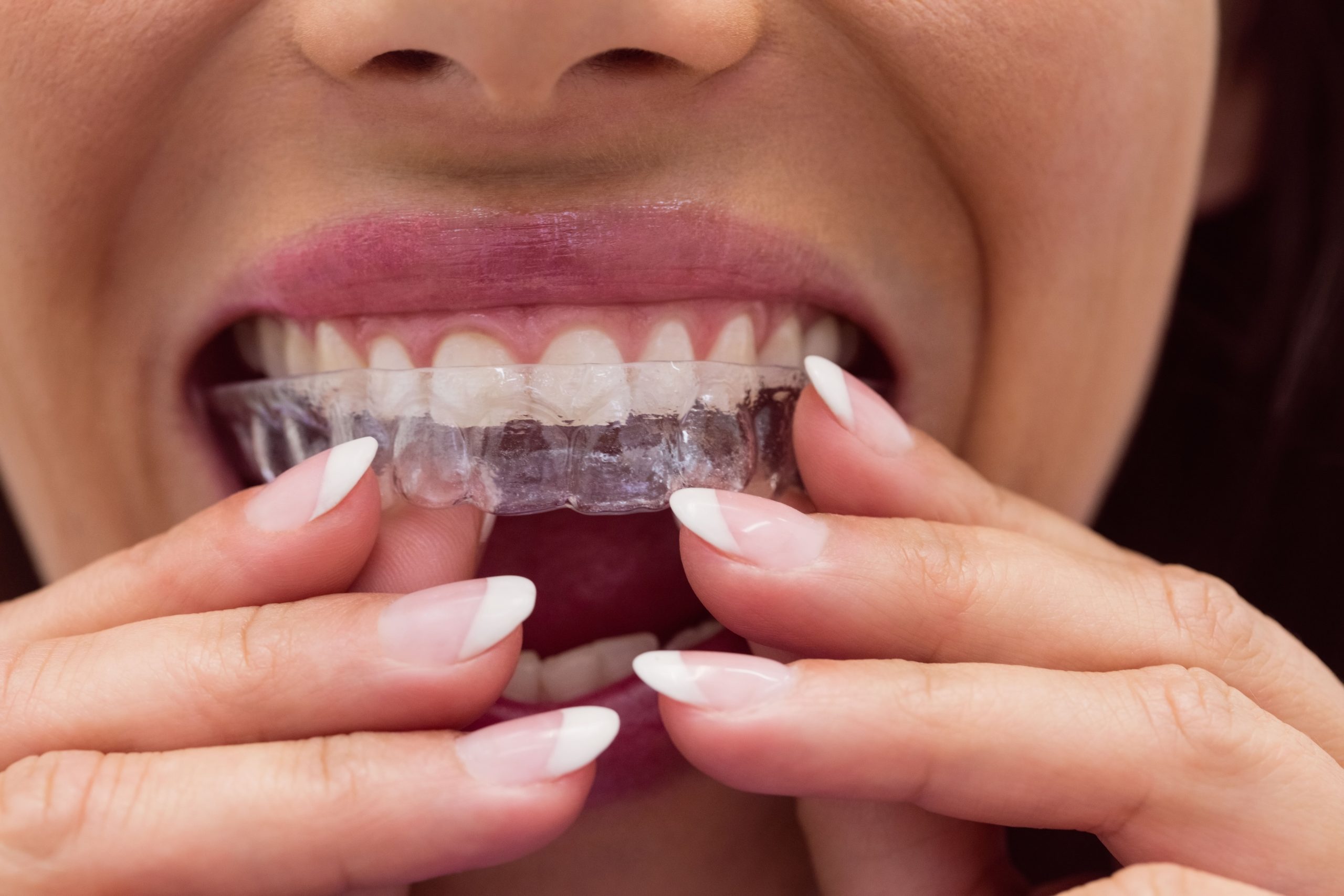Waking up with a sore jaw or a dull headache is frustrating and could be a sign of nightly teeth grinding (bruxism). Many people clench or grind their teeth in sleep without realising the damage it causes. Over time, the pressure chips away at enamel and stresses the jaw, leading to pain and expensive dental problems.
Talk to your dentist about a Night Guard for Teeth Grinding, a comfy, tailor-made guard that helps you wake up pain-free and keeps your smile safe.
In this guide, we’ll gently explain why protecting your teeth (and jaw) is vital and how a well-fitted night guard can be like a helmet for your smile. By understanding bruxism and learning dentist-approved tips, you can keep your teeth strong and wake up pain-free.
Understanding Teeth Grinding (Bruxism)
Teeth grinding, known as bruxism, often happens at night. It’s surprisingly common: people might grind their teeth when stressed, anxious, or even during a vivid dream. Some causes include stress, misaligned bite, or certain sleep problems. When your teeth rub together forcefully, your smile takes the hit.
In bruxism, the jaw muscles clench tightly, and the teeth slam together dozens or hundreds of times each night. You might not feel it happening, but the signs are real.
- Stress and Tension: Like carrying a heavy backpack of worries all day, your jaw carries stress at night. If you’ve been tense or anxious, you’re more likely to grind your teeth unconsciously.
- Sleep Issues: Problems like snoring or sleep apnea can trigger grinding as your body tenses up during disturbed sleep.
- Bite or Alignment: Even a small misalignment in your bite or dentures can cause uneven pressure and lead to grinding.
Signs and Consequences of Night Grinding
How can you tell if you’re grinding your teeth while asleep? There are some common clues to look (and listen) for:
- Morning Jaw Pain or Headaches: If you wake up with aching jaws, temples, or a headache, it’s like carrying over tension from the night. Bruxism can give you a tension headache.
- Worn, Chipped, or Flattened Teeth: Over time, grinding wears down tooth enamel. Your teeth may look shorter or flatter. Chipping is like nicking a knife’s blade on a rock – repeated force over time.
- Tooth Sensitivity: Exposed dentin from worn enamel can make teeth sensitive to hot or cold foods.
- Sore Facial Muscles: The muscles around the cheeks and temples may feel tender, as if you’ve done an intense workout with them all night.
- TMJ Discomfort: Grinding stresses the jaw joints (temporomandibular joints). You might notice a clicking or popping sensation when you open your mouth.
How Night Guards Work to Protect Your Teeth
A clear, custom-fitted night guard offers a protective barrier between upper and lower teeth, absorbing grinding forces. A night guard (often called an occlusal guard or bite splint) is typically made of smooth acrylic or durable plastic, custom-shaped to fit snugly over your upper or lower teeth.
- Pressure Absorber: When your jaw clenches, the night guard takes the force so your teeth don’t. Instead of teeth slamming together with all their might, the night guard disperses the energy.
- Cushioning Barrier: It prevents enamel-on-enamel contact. Without it, grinding is like sandpaper grinding wood – damaging and irreversible. With the guard, it’s like sandpaper hitting soft rubber; the guard wears a little, protecting the tooth.
- Jaw Alignment: A properly fitted guard can help keep your jaw in a more relaxed, neutral position. This can ease jaw-muscle tension and reduce TMJ discomfort.
- Preventing Dental Damage: Cracked, chipped, or worn-down teeth can often be avoided by using a guard. If you’ve ever driven with a cracked windscreen, you know how one small chip can quickly spread. A guard helps stop cracks in the early stage.
After putting it on, you should be able to close your mouth comfortably – the guard should absorb all the grinding. Over time, your dentist can check its wear and replace or adjust it.
Types of Night Guards: Over-the-Counter vs Custom
Not all night guards are created equal. You have options ranging from generic drugstore appliances to tailor-made dental devices. It’s helpful to know the difference:
- Stock (One-Size-Fits-All): These are ready-made guards you can buy at a pharmacy. They’re the least expensive but also the least comfortable. They may feel bulky or ill-fitting and can even increase clenching because they don’t fit right. Dentists rarely recommend these for chronic grinders, as they can be hard to keep in place.
- Boil-and-Bite Guards: Found at sports stores, these are softened in hot water and bitten into to create a shape. They fit better than stock guards and cost a little more. However, the fit is still imperfect – think of it as a hat you can mould slightly versus one made exactly for your head. People with minor grinding habits sometimes use these as a temporary fix.
- Custom-Fitted Guards: Made by a dental professional, these offer the best protection. Your dentist takes an impression (or scan) of your teeth and creates a guard just for your mouth. The fit is snug and comfortable. For serious grinders, custom guards are worth the investment. They last longer and do a superior job of protecting teeth.
The material also varies:
- Hard Acrylic: Often used in custom guards for heavy grinders. It’s stiff and durable, ideal if you grind a lot.
- Soft or Dual-Layer: Softer guards (like thick rubber) can be more comfortable but may wear out faster if you grind hard. Some guards have a soft inside layer and a harder outside layer, giving comfort and strength.
Getting the Right Night Guard in Ipswich
If you suspect you need a night guard, the first step is to visit a denture clinic in Ipswich. Dentists are like trained mechanics for teeth – they can diagnose the problem and fit the right solution. Here’s what typically happens:
- Assessment: The dentist examines your mouth and asks about symptoms (jaw pain, broken teeth, etc.). They may look for wear on your teeth or ask about sleep habits.
- Impressions or Scanning: If a custom guard is chosen, they’ll take impressions of your teeth or use a digital scanner. This is painless – you bite into putty, or the dentist simply scans your teeth with a small wand.
- Guard Fitting: A dental lab creates your guard. At the fitting appointment, the dentist checks the guard for comfort and makes any tweaks. They ensure your bite feels even when wearing it.
- Follow-Up: You may need a check-up to fine-tune the guard. Over time, wear patterns show if adjustments are needed.
In Ipswich, finding a clinic with bruxism experience is valuable. Look for dentists who discuss night guards proactively. A good dentist will explain all options (without up-selling) and respect your comfort and budget.
Using and Caring for Your Night Guard
Once you have your night guard, a few simple habits will keep it effective and hygienic:
- Use Every Night: The guard only helps if you use it consistently. Even one night off leaves your teeth vulnerable.
- Clean it Daily: Brush the guard gently with toothpaste or mild soap (avoid hot water, which can warp it). If you skip it, bacteria or odors can build up.
- Store Properly: Most guards come with a ventilated case. Always let it air-dry first to prevent mildew, then store it safely away from pets and children.
- Watch for Wear: If the guard becomes cracked or flattened, it’s time for a replacement or adjustment.
- Regular Check-ups: Bring the mouthguard to dental visits. Your dentist will examine your teeth. Sometimes, bite changes or new grinding habits require a new mouth guard.
Conclusion
Night-time teeth grinding might feel like an invisible problem, but its effects are very real. By understanding bruxism and taking steps to protect your teeth, you’re investing in your long-term dental health. A night guard for teeth grinding, especially a custom one, shields your teeth and jaw from harm while you sleep. Combined with healthy habits, it can prevent headaches, jaw pain, and costly dental repairs down the track.
Every morning you wake up free from pain will be a reminder that protecting your smile at night is well worth it. If you experience signs of grinding, consider talking to a dental professional. They can guide you through options and help you find a comfortable solution.
For personalized advice and tailored treatment, contact your dentist promptly. Book an appointment with us today to explore night guard solutions and protect your smile.
FAQs:
-
Are custom night guards comfortable to wear?
Yes. Because each guard is molded to your unique bite, it feels more natural and much more comfortable than one-size-fits-all options. We make sure it sits snugly without unnecessary bulk.
-
How is a custom night guard made and fitted at Raceview?
During your appointment, we take detailed impressions of your teeth and bite. Those impressions are sent to a dental lab to fabricate the guard so it matches your mouth exactly. At your follow-up visit, our team checks the fit and makes any needed adjustments so the guard rests securely and comfortably on your teeth.
-
How much does a custom night guard cost?
The price varies based on the design and materials used. At Raceview, we will give you a clear quote during your consultation.


